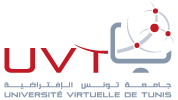FAQ
1. How do I enroll in an online course at VUT?
You can enroll at one of VUT courses by applying online.
VUT launches two English training sessions per year, one starting in October and a second one in March or April. An announcement is published in the press and on VUT website prior to course start.
2. How long does the training last and how is it administered?
The training session lasts 16 weeks, after completion you can enroll in another course or choose to take up in a more advanced level.
3. Which course should I choose?
When applying for a course, you have to take up a level test that will determine your level of English and the course that suits your needs.
4. Are there face to face sessions? Where do they take place?
This training is basically a distance learning course, yet there are some face to face sessions held at the Virtual University of Tunis and vary according to the course ;usually about 3 to 4 non compulsory sessions.
5. How is evaluation carried out ?
There are a number of online assignments and tasks, oral activities as well as self-evaluation assignments. At the end of the courses learners have to sit for a written exam and also have an oral test at the VUT main office.
6. Do I get a certificate at the end of the training?
Students who complete the course are awarded a certificate from VUT certified by the ministry of higher education.
7. What are the minimum technical requirements and the IT skills needed or e-learning?
Equipment required: PC, headset and webcam-Internet Access – a high speed connection is recommended. Active email account -Adobe Flash Player and Adobe Acrobat Reader (available via free Internet download).
